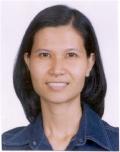|
|
| Global Perspective |
| December 21, 2004 |
Vol. 2, No. 33
|

Gemma Tulud Cruz is a doctoral student in feminist theology at the University of Nijmegen, the Netherlands. Her email address is serenity3_99@yahoo.com "Asian Christians have more experience with living with other religious traditions than the rest of the world" and that "this provides a ground for reflecting upon both what unity means in the Christian community and what the unity of humankind means."
-- Precious Blood Fr. Robert Schreiter
|
The future of Asian theologyBy Gemma Tulud Cruz KUALA LUMPUR, Malaysia - Vision and passion, energy and creativity. These are the words that came to me as I stood as a witness to the landmark gathering of 69 budding theologians for the Asia Conference of Theological Students last July. The conference theme was "Issues, Trends and Challenges in Theology in Asia." Participants came from 13 Asian countries; four guests came from Europe, the United States, Africa and the Middle East.
First of all, young people -- touted in most cultures as the hope for the future -- made up the majority of the participants. Even the older participants were mostly in the early stages of their theological studies. Secondly, the theological issues, trends, and challenges that were tackled explain why many look to Asia as a sign of hope and promise as people in the rest of the world increasingly face the reality that Asians have lived with for generations and centuries: religious and cultural plurality. Asian Christians are a minority in this vast and diverse continent. Thus the multicultural and multireligious context of Asian Christianity and how Asian Christians live with this reality may possibly be Asia's most significant contribution to the universal church. It is not surprising then that figuring prominently in the conference's sessions and gatherings was the need to understand and dialogue more deeply with Asia's other religions and religious traditions. One of the conference speakers was esteemed theologian Precious Blood Fr. Robert Schreiter. He said that Asia and Asian theologians have a special task in forging "a theology that does not only articulate the difference and the local but a theology that also serves as a basis for unity and commonality."
He then specifically identified the Asian notions of "harmony" as a way of living together in peace as an important resource for a theology that "imagines the whole," i.e., a theology of and for the future. Participants were eager to understand and enter into deeper dialogue with Islam. At their request, the organizers, Edmund Chia of the Federation of Asian Bishop's Conferences and Hope Antone of the Christian Conference of Asia, put together an extra session on "The Rise of Militant Islam" by noted Jesuit scholar on Islam Fr. Tom Michel. The assembly gained richly from the presence and sharing of an Indonesian participant who witnessed the Muslim-Christian riots in Ambon in 1999 that razed his school's library and of a Muslim woman participant also from Indonesia who is studying and writing on Christian theology for her doctorate. (She teaches at an Islamic university and lectures on Islam at a Catholic university.) They drove home to the participants the great need to understand Islam. For Asian Christians this is a need we cannot afford to ignore not only because the four largest Muslim populations in the world are in Asia (Indonesia, India, Pakistan, and Bangladesh) but also because Islam's militant form has strong Asian roots. The young Asian theologians also placed ecumenism high on their agenda. In a statement released at the end of conference, the students wrote that, too often, the ecumenical movement is hampered by complacency and the strong tendency among Christian denominations to remain in their comfort zones. The participants pointed out, for instance, the lack of efforts toward visible Christian unity when there are no problems, an attitude they described as: "I'm okay, you're okay, we're okay, so let's leave things be." Whether these challenges will indeed find theological responses remains to be seen. If the participants will really take up these issues as their theological vision and passion as they develop and mature in their theological reflections, there is much hope, and the future is indeed bright for Asian theology. History shows how the Asian youth themselves have, from time to time, given hope and courage to their fellow Asians as well as people all over the world. The Filipino youth, particularly those known as GenteXt or Generation Text for their mastery of cell phone and text messaging technologies, played a singular role in the conscientization and mobilization (particularly through sending SMS) for the People Power II revolution in January 2001 that removed a corrupt and inept President Joseph Estrada.
Lastly, the Indonesian students' protests in the late 1990s against the Suharto regime also points to this passion for justice and change for the better that burns in the hearts of the Asian youth. Who could forget Feb. 26, 1998, in Jakarata when 26,300 students defied the oppressive police and held rallies calling for democratic political reforms? Indonesia, which just completed its first nationwide direct election of a president, is a shining example of the triumph in the struggle for and transition from an authoritarian to a more democratic form of government. "Tell me about your youth and I'll tell you about your people's future" is an oft-repeated quote. I believe the same is true for the church and Christian theology, in this case, Asian Christian theology. As the authoritarian tendency of the institutional church, towards Asian Christian theologians takes its toll on established Asian theologians, these young and neophyte theologians are stepping up. They can and have to keep the fire burning in envisioning and articulating Asia's gift to the global church: how to live in harmony with diversity. More on the web
|
|||||||
| Copyright
© 2004 The National Catholic Reporter Publishing Company, 115
E. Armour Blvd., Kansas City, MO 64111
TEL: 1-816-531-0538 FAX: 1-816-968-2280 |